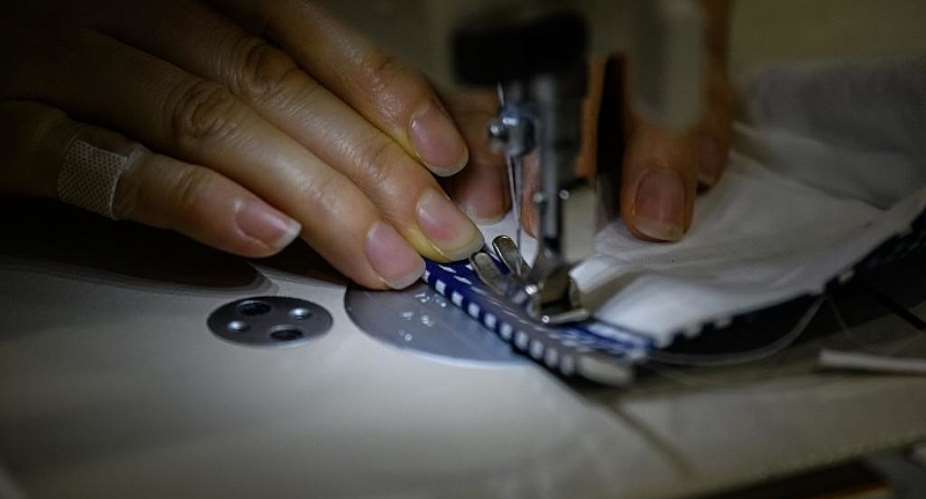Health workers, paramedical staff, firefighters and supermarket staff in France are still facing a shortage of face masks as the coronavirus crisis continues. Thousands of volunteer designers and dressmakers have stepped in to organise the production of new masks via social and local networks. But they need more help – and more fabric.
"I've been making masks for a month and a half. I knew we would need fabric masks," says Raphaëlle Mat, childminder and founder of the "Couturières solidaires", or solidarity dressmakers network.
"I created my network very quickly in my tiny village by putting an ad on a local social network. In 48 hours, there were 36 dressmakers," she told RFI from her home near Aix-en-Provence, south of France.
Mat then decided to spread the initiative by creating a Facebook page where volunteers could coordinate and find a network in their region.
Facebook and local networks
The solidarity dressmakers movement currently has about 7,000 members across 80 departments in France, consisting of professional and non-professional seamstresses.
"Since we're in lockdown, we need to find out what's needed around us. Here in Montreuil, it's all about networking and word-of-mouth," says designer Fatimata Sy.
"We put a post on Facebook and if we need fabrics, people can leave them outside where a volunteer can pick them up," she adds.
Alternative masks
The masks are alternative to medical masks: neither surgical nor FFP2. They are made of cotton and washables, and produced according to an AFNOR approved model.
"What I liked about this network was the charter on hygiene, the sanitary protocols and the whole procedure, from the gathering of fabric donations to the collection of masks. I thought it was very professional," says Sy.
The homemade masks are distributed to firefighters, gendarmes, nurses, hospitals, retirement homes, cashiers and life auxiliaries.
"We've prioritised people who are in direct contact with the virus," explains Mat.
Since 3 April, the wearing of an alternative mask for every citizen has been recommended by the French Academy of Medecine.
Fabric, volunteers needed
"We've been holding up for three weeks, with dressmakers sewing up to 15 or 17 hours a day. We make masks with our own fabric," says Mat.
But they are in need of more textiles and extra helpers from across all fields -- from computing and communication to those who can canvass local governments and fabric stores"
"Our seamstresses have really developed a fantastic collective intelligence with a lot of values, recuperation, DIY, free and short circuit," says Mat. "I think we're on the verge of a profound societal change, and this movement is an example of that."





 We’ll protect state wealth from opaque deals – Prof Jane Naana
We’ll protect state wealth from opaque deals – Prof Jane Naana
 Mauritania president says running for second term in June polls
Mauritania president says running for second term in June polls
 I won't ever say I was a mere driver’s mate' — Prof. Opoku-Agyemang
I won't ever say I was a mere driver’s mate' — Prof. Opoku-Agyemang
 2024 polls: 'EC struggling to defend credibility'— Prof. Opoku-Agyemang
2024 polls: 'EC struggling to defend credibility'— Prof. Opoku-Agyemang
 Akufo-Addo gov't's 'greed, unbridled arrogance, unrestrained impunity, sheer dis...
Akufo-Addo gov't's 'greed, unbridled arrogance, unrestrained impunity, sheer dis...
 Election 2024: Ghana needs an urgent reset, a leadership that is inspiring – Ma...
Election 2024: Ghana needs an urgent reset, a leadership that is inspiring – Ma...
 Partner NDC to rollout a future of limitless prospects – Prof Jane Naana Opoku-A...
Partner NDC to rollout a future of limitless prospects – Prof Jane Naana Opoku-A...
 NPP will remain in gov’t till Jesus comes — Diana Asamoah
NPP will remain in gov’t till Jesus comes — Diana Asamoah
 Sunyani Technical University demands apology from former SRC president over sex-...
Sunyani Technical University demands apology from former SRC president over sex-...
 'Dumsor' was resolved by Mahama but ‘incompetent' Akufo-Addo has destroyed the g...
'Dumsor' was resolved by Mahama but ‘incompetent' Akufo-Addo has destroyed the g...
